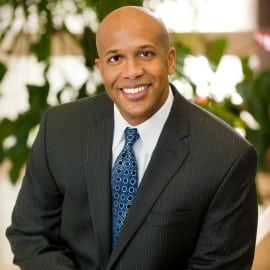
Radiant Solutions has supported the National Geospatial-Intelligence Agency for years, but in June 2018, the company was named a prime contractor for the first time to support NGA’s core Foundation GEOINT mission.
Janus Geography is NGA’s prime contract for geographic content management. As a combat support agency, NGA makes geographic data and safety of navigation products available to the U.S. and its allies to support global missions.
Tony Frazier, president of Radiant Solutions, a Maxar Technologies company, spoke with WashingtonExec about the win as well as where the company is headed over the next couple years. Frazier leads a team of more than 1,000 aerospace engineers, geospatial analysts, weather and ocean experts, software developers, data scientists and DevOps engineers who bring disruptive innovation to customers’ mapping and intelligence missions in both national security and the commercial sector.
The Janus Geography program is valued up to $920 million over up to 10 years. The program allows NGA and its customers to access up-to-date content through living maps and real-time analytics.
“This is a part of NGA’s strategy to move more of their core mission from classified environments into unclassified environments,” Frazier said. “Their objective is to tap into new sources of geospatial data, whether they come from commercial satellites, or crowdsource data, like OpenStreetMap, or social media. Being in a position where we can do that content management function for all the geographic data for NGA as a prime contractor, we feel it will enable the agency to turn data into decisions and allow them to take action quicker. This is going to be a great way to bring innovation into the agency.”
As part of the contract, Radiant Solutions will be not only manage the data but also merge it from different sources — crowdsourced, commercial and government – and then convert them into “living maps” that can readily be used by warfighters, first responders, policymakers and others.
“We’ve supported NGA on a number of efforts that include development of technology that supports both crowdsource mapping and big data analytics,” Frazier said. “We’ve done that through a combination of tapping into open source software, public data and cloud infrastructure.”
Radiant Solutions has worked with NGA for years in various other missions.
“Several years ago during the Ebola crisis, we provided seven countries worth of shareable data to NGA that it then made available to the public to support emergency response,” Frazier said. “We’ve also supported dozens of humanitarian assistance, disaster response campaigns, but we were already providing a data feed into someone else that integrated that data into NGA’s missions. Now, we’ll be in a position to support them much more directly to advance their mission by revealing insights where and when it matters to build a better world.”
Frazier has been with Radiant Solutions and its predecessor companies for eight years through a number of changes, recently merging seven disparate businesses under the Radiant Solutions umbrella.
Radiant Solutions is an award-winning company, and it is growing. For two years in a row, its Tampa, Florida, location has been named a best place to work. The company, which is headquartered in Herndon, Virginia, is undergoing a major renovation to its Herndon facilities that should wrap in the coming weeks.
“When we think of who we aspire to be as Radiant Solutions, it’s about enabling geospatial analytics at scale,” Frazier said. “The business is growing. We’ve been a consistent double-digit topline grower. As a result, we are actively hiring many people, so we’ve made public statements, but it remains the case that we anticipate hiring close to 300 people in the next 12 months. I think we have over 150 openings today that we’re actively recruiting for, and that’s all good.”
As Radiant Solutions continues hiring, it wants to become a model for innovation, diversity and community engagement across all of its talent centers, which includes the hiring of millennials. Frazier consistently sees employees focused on mission and desiring active learning.
“They want to be able to apply their trade and grow from it, and then know that we support a meritocracy, where those that contribute to the business, whether it’s bringing new innovation, helping us recruit talent, helping us grow the business, that they’re going to not have to wait for a tenure-based advancement, but it’s going to be more merit-based,” he said.

